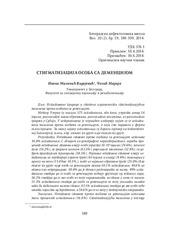Приказ основних података о документу
Stigmatization, persons with dementia
Stigmatizacija osoba sa demencijom
| dc.creator | Milačić-Vidojević, Ivona | |
| dc.creator | Čolić, Marija | |
| dc.date.accessioned | 2021-06-09T14:04:53Z | |
| dc.date.available | 2021-06-09T14:04:53Z | |
| dc.date.issued | 2014 | |
| dc.identifier.issn | 0354-8759 | |
| dc.identifier.uri | http://rfasper.fasper.bg.ac.rs/handle/123456789/848 | |
| dc.description.abstract | Aim: To determine the degree and the nature of stigmatizing opinions towards persons with dementia. Method: The sample encompassed 575 subjects of both sexes, over 16 years old, of various levels of education and of different types of employment. The scale assessment for exploring attitudes towards the persons with mental illnesses (Crisp et al., 2000, 2005) was applied. Participants were asked to answer to which degree each of eight statements of the scale refers to persons with dementia (on five-point bipolar scale). Demographic characteristic regarding, the highest percent of negative attitudes displayed participants aged 16-19 (16.8%), female (54.2%), with secondary education (62.5%), with medium to good incomes (58.5%) and workers (52.8%) The least negative attitudes displayed oldest participants (over 65) and participants of highest education (25.0%). Less negative attitudes displayed men than women (15.8% vs 18.3%). 30.1% of participants perceive persons with dementia as dangerous, 49.6% as unpredictable, 50.8% as difficult to talk with. 49% of respondents believe that persons with dementia feel different in comparison to others, 56.2% believe that they can not be blamed for the situation in which they find themselves, 51.3% believe that persons with dementia can not do anything to improve their condition, 43.1% that these people will not benefit from treatment and 54.6% that they can not fully recover. Conclusion: stigmatization attitudes regarding the inability to improve with treatment can be reduced through education of the public about the benefits and effects of the treatment of dementia. At the same time, persons with dementia can be encouraged to talk about their experiences and feelings connected to stigma and to diminish vulnerability about being stigmatized. | en |
| dc.description.abstract | Cilj: Ispitivanje prirode i stepena izraženosti stigmatizujućih mišljenja prema osobama sa demencijom. Metod: Uzorak su činili 575 ispitanika, oba pola, uzrasta iznad 16 godina, različitog nivoa obrazovanja, različitih zanimanja, iz različitih gradova u Srbiji. U istraživanju je korišćen intervju kojim su se ispiti- vala mišljenja prema osobama sa demencijom, a koji smo zadavali u formi skala procene. Za svaku izjavu ispitanici su birali odgovor na petostepenoj bipolarnoj skali, npr. opasan po druge-nije opasan po druge. Rezultati: Negativne stavove prema osobama sa demencijom ispoljava 16.8% ispitanika. S obzirom na demografske karakteristike, najveći procenat negativnih stavova imaju osobe uzrasta 16-19 godina (24.6%), ženskog pola (54.2%), sa srednjom školom (62.5%), radničkog zanimanja (52.8%), sa dobro-pristojnim prihodima (58.5%). Najmanje negativne stavove imaju ispitanici iz najstarije uzrasne grupe (65 godina i iznad) (9.8%), muškarci u odnosu na žene (15.8%vs 18.3%.), osobe iz najviše obrazovne grupe (25.0%). Kao opasne po druge ljude osobe sa demencijom opaža 30.1% ispitanika, 49.6% ih opaža kao nepredvidive, 50.8% da je teško razgovarati sa njima, 49% ispitanika smatra da se osobe sa demencijom osećaju drugačije od ostalih ljudi, 56.2% smatra da se ove osobe ne mogu okrivljavati za stanje u kome se nalaze, 51.3% ispitanika smatra da osobe sa demencijom ne mogu učiniti ništa što bi poboljšalo njihovo stanje, 43.1% ispitanika smatra da ove osobe neće imati koristi od tretmana, a 54.6% da se ne mogu u potpunosti oporaviti. Zaključak: Negativne stavove prema osobama sa demencijom ispoljava mali procenat ispitanika (16.8%). Stigmatizujuća mišljenja u pogledu nemogućnosti poboljšanja sa tretmanom se mogu redukovati edukacijom javnosti o koristima i efektima lečenja demencije. | sr |
| dc.publisher | Univerzitet u Beogradu - Fakultet za specijalnu edukaciju i rehabilitaciju, Beograd | |
| dc.rights | openAccess | |
| dc.rights.uri | https://creativecommons.org/licenses/by-sa/4.0/ | |
| dc.source | Beogradska defektološka škola | |
| dc.subject | mental illness | en |
| dc.subject | stigmatization | en |
| dc.subject | dementia | en |
| dc.subject | mentalne bolesti | sr |
| dc.subject | stigmatizacija | sr |
| dc.subject | demencija | sr |
| dc.title | Stigmatization, persons with dementia | en |
| dc.title | Stigmatizacija osoba sa demencijom | sr |
| dc.type | article | |
| dc.rights.license | BY-SA | |
| dc.citation.epage | 399 | |
| dc.citation.issue | 2 | |
| dc.citation.other | 20(2): 389-399 | |
| dc.citation.rank | M52 | |
| dc.citation.spage | 389 | |
| dc.citation.volume | 20 | |
| dc.identifier.fulltext | http://rfasper.fasper.bg.ac.rs/bitstream/id/733/845.pdf | |
| dc.identifier.rcub | https://hdl.handle.net/21.15107/rcub_rfasper_848 | |
| dc.type.version | publishedVersion |


